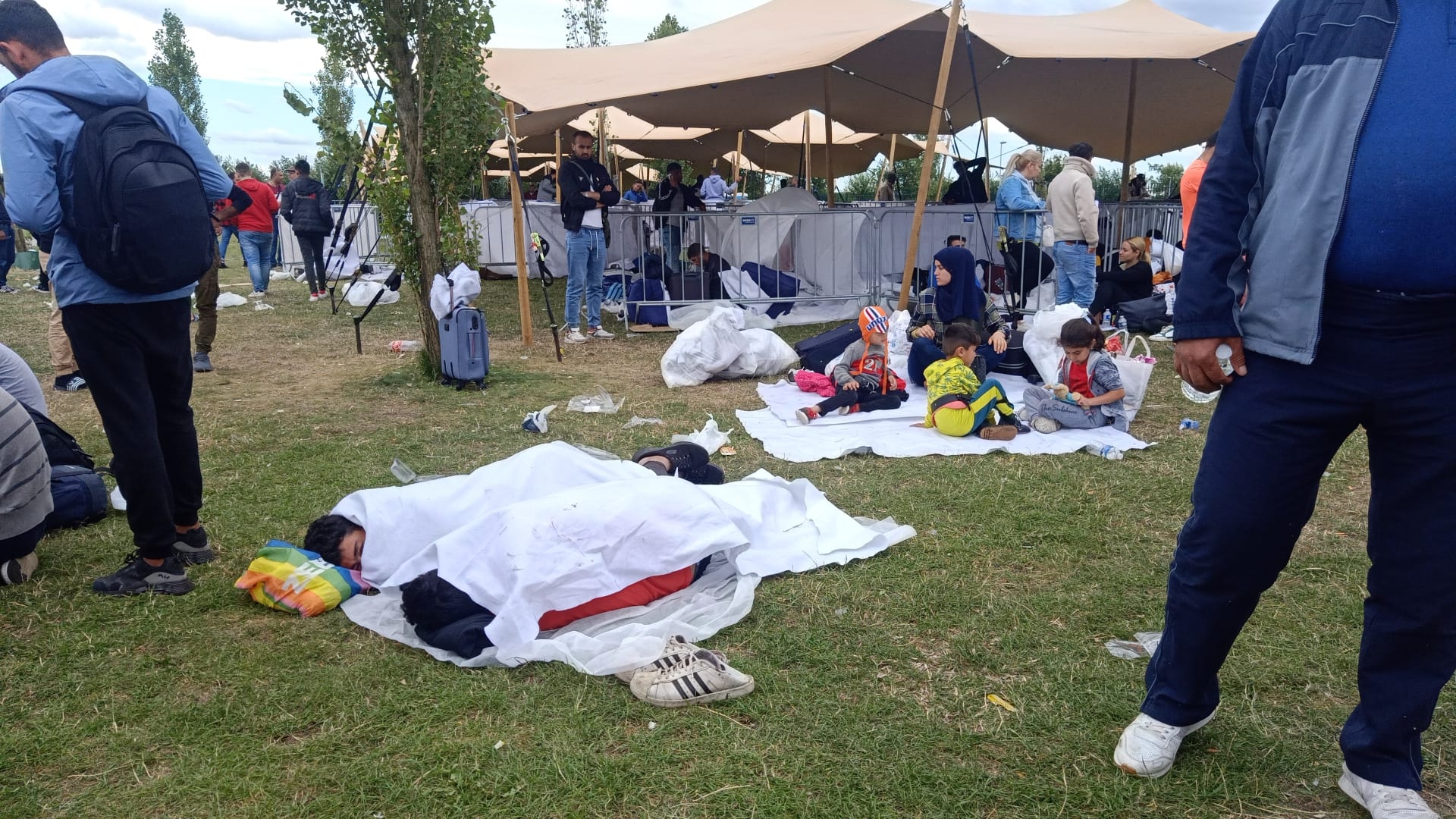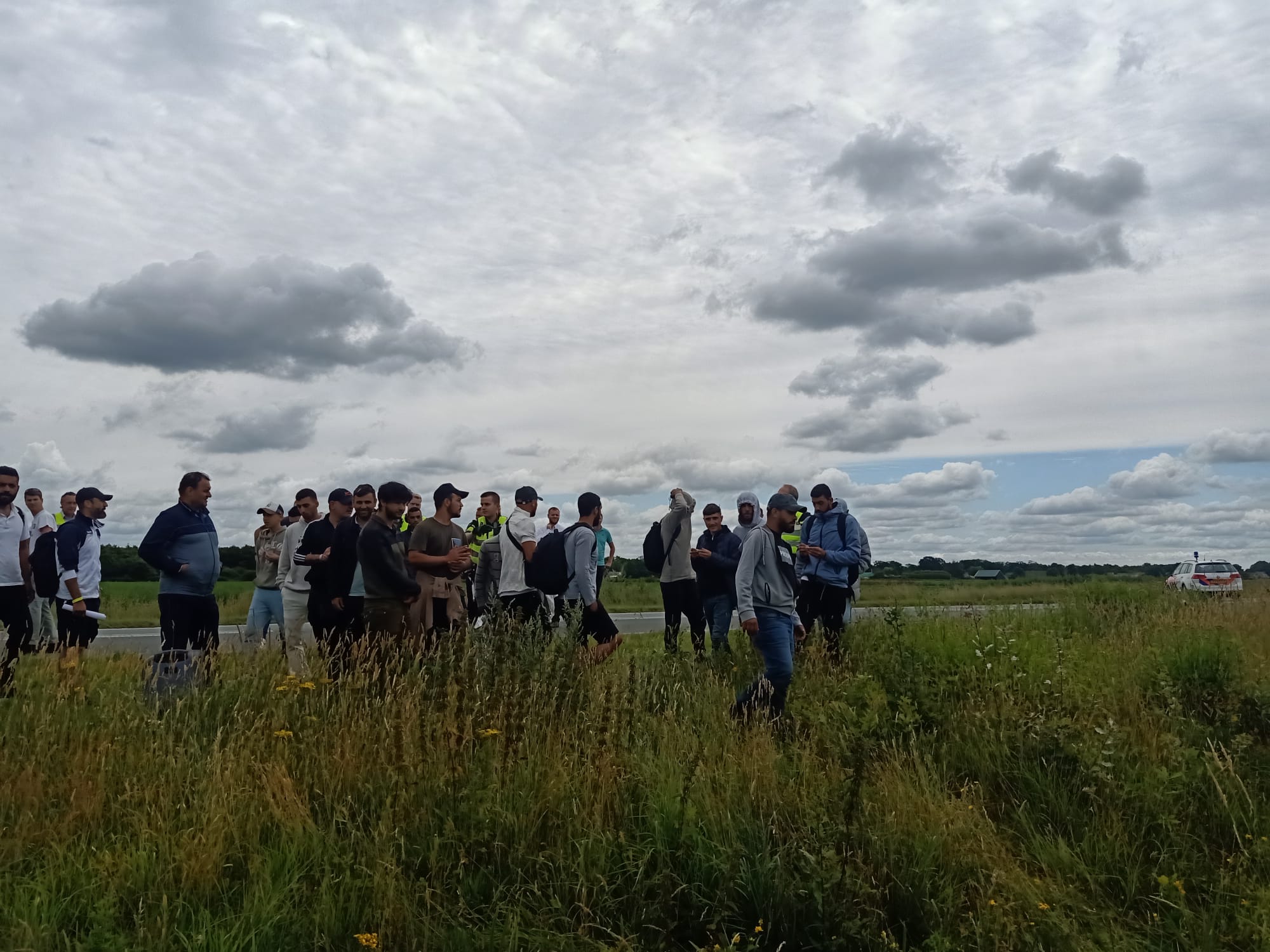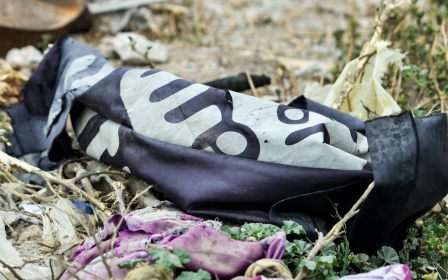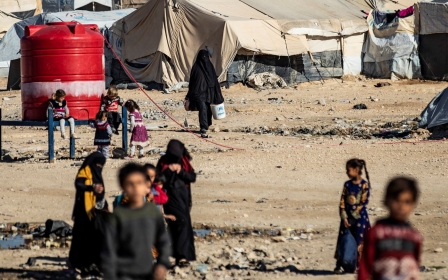Refugees protest against delayed applications in the Netherlands

Dozens of angry asylum seekers gathered on Friday at the main reception centre for refugees in the village of Ter Apel, in the north of the Netherlands, to protest against the delay in starting their asylum applications and the lack of temporary accommodation.
Refugees cut off a transit route between Germany and the Netherlands to draw attention to their situation, after setting up tents weeks ago near refugee camps because of delays in giving them places inside.
'We found that there were dozens of other refugees sitting in tents and open for weeks, waiting for a place in the camps. We can't stand this'
- Refugee
They told Middle East Eye that their conditions are getting worse, because Central Agency for the Reception of Asylum Seekers (COA), the association responsible for coordinating between the refugees and the authorities, has delayed starting the procedures for their asylum applications, leaving them out in the open.
They are appealing to local authorities and immigration officials to treat refugees seriously and to speed up the start of work on their asylum applications.
"We only get one meal a day, which is a slice of toast, a piece of cheese, an apple, a bottle of juice and a bottle of water. This meal is not enough for a child, how can it suffice an adult man or woman," one refugee told MEE, speaking anonymously.
New MEE newsletter: Jerusalem Dispatch
Sign up to get the latest insights and analysis on Israel-Palestine, alongside Turkey Unpacked and other MEE newsletters
"I cannot apply for asylum in another country because I have already started the first step of my asylum application, and I have been fingerprinted in the Netherlands, but they have blocked the rest of the steps."
Good reputation
Refugees newly arrived in the Netherlands go to the main refugee centre after having their fingerprints taken at an initial centre to verify that they are not under prosecution or involved in criminal offences.
The procedures are stopped if it is found that they have fingerprints in another country in the EU, and other procedures are then initiated to return them to that country.
During their nominally illegal journey into the Netherlands, some refugees get picked up in other EU countries, which take their fingerprints and start the procedures for their asylum applications.
But most refugees from the Middle East and North Africa pay thousands of dollars to smugglers to help them reach the Netherlands, which has a good reputation in terms of the reception and treatment of refugees.
This good reputation has greatly increased the pressure on the Netherlands.
One of the newly arrived refugees told MEE that he and about 400 others secured an appointment on Thursday in the first centre, while hundreds of other arrivals did not get an appointment, confirming that hundreds arrive daily.
According to local procedures, the fingerprinting process for refugees in the Netherlands begin after it was verified that their fingerprints were not taken in another country. After that came the procedures for organising an interview with the police for refugees to explain their conditions and the reasons for their asylum.
Rising anger
The refugees are supposed to wait in camps designated to receive them, and, following the police interview, they return to their place in the camp, where they stay between three to six months until their asylum application is either approved or refused.
The number of new arrivals has made the camps overcrowded and left hundreds sleeping in the open for weeks, waiting for a place to be found for them in the camps.
Refugees say COA is not helping them effectively.
COA did not immediately respond on the weekend to a Middle East Eye request for comment regarding the delay in processing the refugees’ applications.
During a WhatsApp call with one refugee, MEE heard a heated argument between her and local officials trying to ease the tension. The argument subsided after she told them she was talking to a journalist and that it was illegal to let asylum seekers sleep in the open.
"We arrived yesterday evening, and the officials told us that they would give us a place in the camps, and so far we haven't got a place. We spent last night in the open," the refugee said.
"In the morning we found that there are dozens of other refugees who have been staying in tents or in the open for weeks, waiting for a place in the camps. We can't stand this."
The lack of services, such as the internet, has worsened the situation of the refugees, with most of them coming from countries with SIM cards that do not work in the Netherlands, which prompted some of them to speak to MEE through an intermediary.
Some refugees ask other refugees for a lot of money in exchange of letting them use their internet or makes calls and send messages.
"I have been here for a month, since 14 June, and every day they promise us that they will start the procedures," a displaced person from Syria's Idlib told MEE.
"They took us on buses to a sports stadium, where we stayed for weeks, and then yesterday they brought us back to start the procedures, but they threw us out in the open,” added the man, whose journey to reach the Netherlands had lasted two months.
"The situation is catastrophic, there are hundreds of refugees."
Catastrophic situation
"I have been here since the 3 July. An interpreter came with the police today, and I suggested that the refugees who have not been fingerprinted go to Germany," another refugee said.
"As for me, I have been sleeping here in the open for 15 days. I can bear it as a man, but there are children and women, and sick people here. We appeal to human rights organisations to help us."
The refugees told MEE that the local police cordoned off the sit-in and held a meeting with local associations to address the situation. However, not much has changed so far, except for cleaning the area to improve the accommodation of the refugees.
The number of people around the world who have been forcibly displaced has reached 89.3 million by the end of 2021. Among them are nearly 27.1 million refugees, around half of whom are under the age of 18, according to the United Nations High Commissioner for Refugees.
The largest number are from Syria, which has been gripped by war since 2011, then from Venezuela, followed by Afghanistan and South Sudan.
EU countries have pledged to allocate $6.4bn this year to just support Syria and the countries hosting Syrian refugees.
Middle East Eye delivers independent and unrivalled coverage and analysis of the Middle East, North Africa and beyond. To learn more about republishing this content and the associated fees, please fill out this form. More about MEE can be found here.






